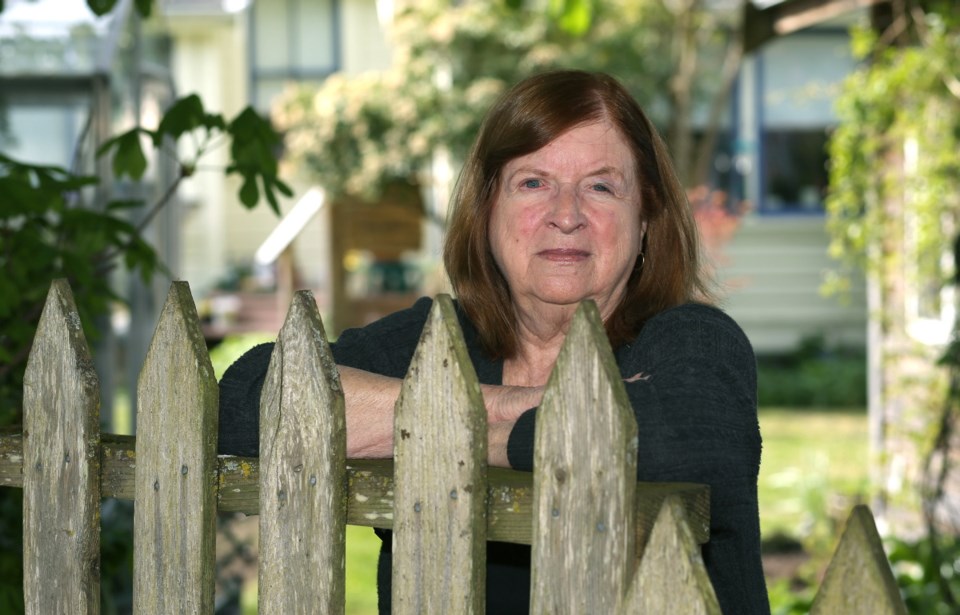 West Coast writer Audrey Thomas loves a good mystery.
West Coast writer Audrey Thomas loves a good mystery.
Mystery No. 1: Her new novel, Local Customs, is based on the true story of Letitia Landon, a 19th-century poet who may or may not have committed suicide by taking prussic acid.
Mystery No. 2: Thomas is now writing a novel inspired by the true story of an English couple who rekindled their teenaged romance in middle age. Then, realizing their mistake, they carried out a suicide pact. The woman survived and became a cleaning lady — a detail Thomas finds fascinating.
“Because when you’re a cleaning lady,” she said, “everything has to be tidy and clean.”
Now 78, Thomas — who divides her time between Victoria and Galiano Island — is a prominent Canadian writer. You may know her other books, which include Songs My Mother Taught Me (1973), Intertidal Life (1984) and Isobel Gunn (1999). She won B.C.’s Ethel Wilson Fiction Prize three times and is an officer of the Order of Canada.
Local Customs is a compelling, skilfully crafted novel worth seeking out. Letitia (or Letty) is in her mid-thirties, almost beyond marrying age. Although she’s a popular writer who manages to support herself, Letty realizes her style of flowery poetry is poised to go out of style.
So it makes sense for her to marry George Maclean, a well-meaning but desperately dull man who’s a governor in West Africa. He takes her Cape Coast Castle where the pair begin living, in a very Victorian manner, almost separate lives. Witty and talkative, Letty misses London society. As for George, well... he’s a man of few words who spends evenings sawing out Scottish ditties on his fiddle.
In Letty’s voice, Thomas writes: “Sometimes, when George and I met up for a ‘wee dram’ before dinner (whiskey for him, ginger beer or sherry for me) he would look at me in puzzlement and blink his eyes once or twice. I think for a moment he had no idea who I was.”
Thomas met up for an interview in her small 1911 cottage, a slightly topsy-turvy home on what once was a Fairfield farm. In years past, she confided, the neighbour’s son drove her bonkers with his nocturnal electric guitar sessions. She has another residence on Galiano Island, where she’s lived for 44 years.
Thomas — who’s fair-skinned, red-haired and rather jolly — admits to being a “terrible” housekeeper.
“If the dishes are done and the beds are made, I can write,” she said. “But I’m not going to fuss around, making everything spotless and wonderful.”
She got the idea for Local Customs 50 years ago. Thomas and her family moved to Ghana in the mid-1960s after her husband was invited to teach at a university there. They were ready for a change. Feeling restless after a few years of living in the “shabby, gentile part” of Kitsilano, they’d originally considered moving to Yellowknife. But Thomas and her husband, who had two youngsters, cooled on the idea after being warned sled dogs were not pets and strictly off limits to children.
In Ghana, Thomas visited Cape Coast Castle, where the policeman conducting the tour showed them the graves of George Maclean and Letitia Landon. He explained Landon was a famous writer who died a mysterious death soon after her arrival.
“It intrigued me that she married this guy, went to Cape Coast and eight weeks later, she was dead,” Thomas said.
She didn’t get around to writing Local Customs for decades. Raising children and other writing projects intervened. As a young mother, Thomas had only sufficient uninterrupted time to jot down short stories (in long hand, she doesn’t type) let alone write a novel.
Her first published story, If One Green Bottle ..., was published in Atlantic Monthly in 1965. This led to her first short-story collection, Ten Green Bottles, two years later.
“It was a miracle to get the book of stories finished,” Thomas recalled.
She grew up in Binghamton, New York — five kilometres out of Pennsylvania. Thomas was smart (she skipped a grade) and shy (skipping the grade and encountering taller classmates exacerbated this).
She loved writing, though. In junior high, Thomas entered a contest with a poem about the Tomb of the Unknown Soldier. It was well crafted, but shrewdly, deliberately written in a sentimental way. She won $15 and promptly bought a pair of saddle shoes.
In Grade 8 she took a journalism class — “one of the happiest years of my school life.” Thomas flirted with the notion of becoming a reporter. As a young adult she found success working as an ad writer for a department store. She dreamed of working in advertising in New York City — a goal that never came to fruition. Her future lay in fiction writing.
It was a friend who told Thomas the story of the couple who had a suicide pack. The survivor was her friend’s cleaning lady. She said they’d decided on suicide after abandoning their respective families to be together.
“They decided they couldn’t go back to their families. It was too humiliating, and they’d likely be unwanted,” Thomas said.
She loves a mystery. As well, Thomas says — as a writer — she’s also interested in fear and what makes people afraid.
Take Letty from Local Customs. Thomas says the real-life Letty did take prussic acids drops for medicinal purposes (she even tracked down a pamphlet on the practice in the rare books room in the British Library). But a surviving letter from her husband said Letty administered this very carefully. So what could cause her to overdose, whether accidental or intentional?
It was some sort of fear, Thomas believes. Something — or someone — filled her with dread.
“I don’t think she intended to kill herself,” the writer said. “But I think she became so afraid that she accidentally did.”



